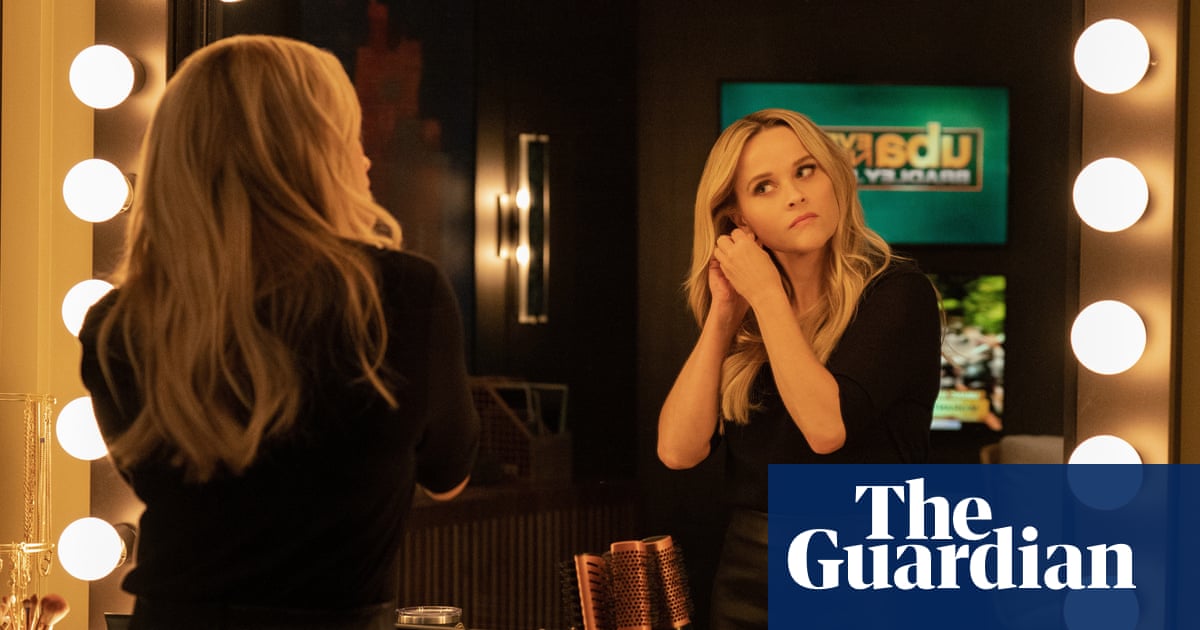
For three seasons, The Morning Show has specialized in provoking a particular type of reaction: something deranged or ill-conceived happens, I shout “nooooo” at my screen and remain slightly stupefied as the show barrels ahead, unrestrained by logic, subtlety or sense.
There’s usually one moment per season that sums up the show’s harebrained, groan-worthy attempt to portray the cutthroat world of New York television media. In the first, it was when Gugu Mbatha-Raw’s show producer Hannah, sexually assaulted years earlier by the disgraced morning show host Mitch Kessler, died dramatically by suicide – evidence that the show’s predominant mode was melodrama. The second season was an expensive masterpiece of bad decisions: dramatizing the pandemic, sending Mitch off an Italian cliff in his car, pairing Bradley Jackson (Reese Witherspoon) with her fellow morning news anchor Laura Peterson (Julianna Margulies) in a shoehorned romance designed for internet shipping.
The third season, now seven episodes in on Apple TV+ and tasked with following all that, starts by sending Bradley to space – in a Bezos-style phallic rocket, no less – and then into the January 6 insurrection. There’s a would-be tech overlord played by, of all people, Jon Hamm, a romance between Hamm’s suave billionaire and Jennifer Aniston’s Alex Levy, and more recreations of the early pandemic. There are vague but finely delivered barbs on mergers, acquisitions and hostile boards. It’s completely serious, very dumb, and highly watchable. By its third season, the Morning Show has finally leaned into DNA as a borderline camp workplace soap that is enjoyable both despite and because of its defiance of good sense.
It’s easy to forget now, but when The Morning Show premiered in 2019, it was supposed to be the anchor of the nascent Apple TV+, the ludicrously profitable tech company’s foray into the streaming wars. It had prestige ambitions – lavish production budgets, long runtimes, intriguing source material (Brian Stelter’s book Top of the Morning, on the real-life morning show wars) and not one but two beloved middle-aged female actors with their most expansive roles in years (particularly for Aniston). The show initially positioned itself as a lush processor of complicated current events, namely #MeToo and the alleged cover-up of sexual misconduct at The Today Show, but also equity in the workplace, Trump headlines and corruption within media conglomerates. Its style – blunt, on the nose, dramatic flourishes more in the lane of network television than Succession – made handling such thorny topics difficult. The effect was more hit-and-miss rollercoaster than meaty marquee drama.
The third season remains ridiculous and messy, the least reasonable of a recent string of workplace shows interrogating our relationship between work and life, including Succession, The Bear, The Other Black Girl, and Apple TV+’s more critically acclaimed series Severance and Ted Lasso. In the Morning Show, such fraught discussions take the form of the workaholic CEO Cory Ellison (Billy Crudup, the show’s standout performer who best captures its madcap intensity) bragging “I’m starting by launching the first female journalist into space, haven’t you heard?” while in a sauna or each non-white character sincerely stating, at different points, something along the lines of “we were supposed to change things, weren’t we?”
Things only go downhill from the space launch as, by mid-season, it’s revealed that (spoiler ahead, although it doesn’t really matter) Bradley Jackson not only covered the January 6 insurrection as a self-righteous journalist, but also covered up her brother’s assault of a police officer as one of the Maga rioters (but he’s a good guy, we’re assured. He was just following his friends). The deception forms the dramatic backbone of the season, and its re-enactment halfway through is when the show crossed back from aggravatingly fun to borderline unwatchable, another “noooo” at the screen.
The Morning Show has always played fast and flirtatious with beyond oversaturated current events, employing real headlines and footage for timeline accuracy and dramatic gain, but this was too much. Who wants to watch a recreation of January 6 and rehash its post facto coverage? Or, for that matter, yet another plotline set back in quarantine, or the introduction of the vaccine, or the leaked US supreme court memo overturning Roe v Wade, which The Morning Show uses as a reason for the fed-up Black anchor Kris (an underused Nicole Beharie) to write words of protest in red lipstick on the bathroom mirror. (To be fair, that’s a fitting description for The Morning Show’s handling of anything sensitive, including its attempts at addressing racial discrimination in the workplace.) Television can be an apt place to process traumatic events, build creatively off the real timeline or work through complex issues. But The Morning Show’s modus operandi has always been signpost and spaghetti on the wall, making the serious unintentionally silly.
And yet. The show has momentum, in part because of some unwieldy but workable satire (a UBA prestige project about the Donner Party, the perpetually plagued streaming service UBA+) and enough straight-faced earnestness to tip into humor. Mostly, it chugs along on the baseline pleasure of watching beautiful A-listers say and do unbelievable, ridiculous things, and in seeing so much money thrown so seriously at an enterprise with so little reason. Three seasons in, The Morning Show has found its footing, if not its critical accolades or audience, as prestige nonsense.
